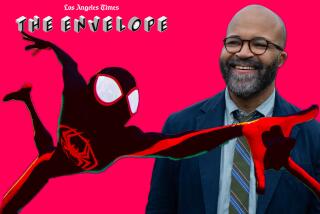George Kuchar dies at 69; influential underground filmmaker
- Share via
George Kuchar was perhaps the most prolific and influential filmmaker most moviegoers have never heard of.
With his twin brother, Mike — and later, alone — Kuchar made some of the earliest films in the 1960s explosion of underground movies.
He often sent up the B-movies of his youth in irreverent parodies with equally campy titles. In the mid-1960s, Kuchar followed “Corruption of the Damned” with a work that came to be regarded as a classic of the alternative scene, “Hold Me While I’m Naked.”
The exuberant auteur of the no-budget film had made nearly 220 movies and videos since the 1950s, and his reach spilled over into the mainstream. The Kuchars influenced such filmmakers as Brian De Palma, David Lynch and John Waters, according to the San Francisco Art Institute, where Kuchar had taught for 30 years.
Kuchar died Tuesday at a San Francisco hospice following a battle with cancer, said a spokeswoman for the art institute. He was 69.
His “remarkable spirit and no-holds-barred approach to filmmaking” inspired students and “the film community worldwide,” Charles Desmarais, the art institute’s president, said in a statement.
The playfulness of Kuchar’s movies also was reflected in the titles of the filmmaking courses he taught after joining the art institute in 1971 — “AC/DC Psychotronic Teleplays” and “Electro-graphic Sinema.”
“He was a goofball and a genius,” said Eddie Muller, a writer and film historian who took Kuchar’s narrative filmmaking class in the 1970s. “He was so smart, so insightful. He was like the greatest filmmakers — in a single moment he could size up a person and know how to use that in his art.”
Although his work could seem off the cuff, it was marked by a tender lyricism and a love of thundering, canned scores, according to Kevin Thomas, a film critic and former Times staff writer.
“He was a really important figure in underground cinema,” Thomas said. “He was part of a movement during a turbulent time, the Vietnam era. Yet his stuff was sweet and fun.”
Kuchar’s loosely autobiographical “Hold Me While I’m Naked” was about the trials of a low-budget filmmaker whose actress quits mid-movie because she resents going nude in every scene. It mock-seriously questioned the relationship of artist to art and came to be regarded as his masterpiece.
Village Voice gave the film the No. 52 spot on its list of the top 100 films of the 20th century.
Other better-known Kuchar works include “I, An Actress” (1977), a short film that features him directing an actress who sputters ludicrously melodramatic dialogue, and “Thundercrack!” (1975), an underground erotic parody that he wrote and starred in. It was directed by his partner in life and film, Curt McDowell, who later died of AIDS.
At a 2007 tribute to Kuchar at the Telluride Film Festival, Kuchar’s friend Buck Henry jokingly called “Thundercrack!” a “wonderfully foul and degrading film.”
The Hollywood melodramas popular during the Kuchar brothers’ childhood infused their films, which featured friends and neighbors. One opening credit read “Starring the Liebowitz Family.”
Born in 1942 in New York City, the brothers began making movies after an aunt gave them a camera when they were 12.
After graduating from a high school that emphasized the arts, George briefly drew weather maps for a local TV station. He had a lifelong fascination with weather, which he later documented in videos.
By the 1960s, the self-taught moviemakers had developed a following in New York’s underground film movement. Eventually, they worked separately but remained close. When George moved to San Francisco, his brother followed. He is George’s sole survivor.
Jennifer Kroot, a former student of George’s, made a well-received and affectionate 2009 documentary about the brothers, “It Came From Kuchar.”
In the film, critic Roger Ebert praises them as “living legends” of experimental film while Kroot gives viewers ample evidence to feel otherwise by including cringe-worthy clips from such 1960s efforts as “I Was a Teenage Rumpot” and “Sins of the Fleshapoids.”
An “in crowd” that included Andy Warhol loved their movies and marveled at how such a heightened sensibility to camp had sprung unassisted in the wilds of the Bronx, the Guardian of London reported in 2009.
“They were fascinated by us because they were all hipsters,” George told the newspaper, “while we were people who, y’know, worked in the post office.”
More to Read
Start your day right
Sign up for Essential California for the L.A. Times biggest news, features and recommendations in your inbox six days a week.
You may occasionally receive promotional content from the Los Angeles Times.





















































